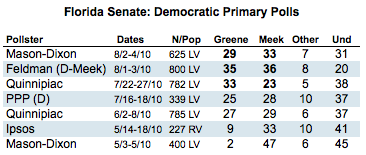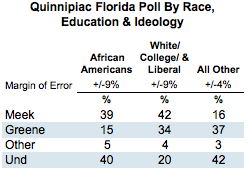
Back in April, I asked rhetorically why Florida Senate candidate Kendrick Meek had earned so little respect from analysts and pundits. I was thinking mostly of the one-on-one general election contest then looming between Democrat Meek and likely Republican nominee Marco Rubio.
That was then. Within a few weeks, Republican Governor Charlie Crist launched his independent Senate candidacy and shortly after that, billionaire real estate investor Jeff Greene jumped into the Democratic primary. Since then, Greene has pumped at least $8 million of his own funds into television advertising and has rapidly gained support in public polls. By late June, the Cook Political Report (gated) was reporting that unnamed "Democratic strategists are beginning to come to terms with the idea that Greene may well win the primary."

The three most recent public polls now show everything from a ten-point Greene lead (Quinnipiac University) to a narrow but not quite statistically significant four-point Meek advantage (Mason-Dixon). A third poll, conducted last week for the Meek campaign, shows Meek (at 36%) in a "statistical dead heat" against Greene (35%). "That Meek's campaign is releasing a poll showing him essentially running even with Greene," the Washington Post's Chris Cillizza concluded last week, is a testament to the dire straits that the Democratic congressman has found himself in."
While a general election contest is another story -- both Meek and Greene currently run far behind both Crist and Rubio -- I can't help feeling that those unnamed "strategists" are still underestimating Meek's base and potential in the August 24 primary.
To get a better sense of Meek's true base of support, I start by asking two questions: (1) What percentage of the primary electorate will be African-American and (2) what percentage will be white college-educated and liberal?
The African American percentage is the easier to estimate since the Voting Rights Act requires that Florida and other southern states maintain and report registration and turnout statistics by race. I obtained the following estimates from Catalist, the Democratic Party affiliated database of vendors. Based on the voters currently registered to vote (i.e. excluding any that have been purged over the last ten years because they have died or moved), they tell me that African Americans are:
- 27% of the 5.4 million registered Democrats in Florida
- 25% of the 828,401 who voted in the Democratic primary in August 2008
- 21% of the 837,192 who voted in the Democratic primary in August 2006
- 24% of the 1.98 million who voted in any Florida Democratic primary since 2000 held in August or September
- 20% of the 1.7 million who voted in the Democratic presidential preference primary in January 2008
And in case you are wondering, yes there was a significant boost in African-American registration just prior to the 2008 general election. Catalist also reports that African-Americans were 41% of the 329,121 voters that registered after the 2008 presidential primary and cast a ballot in November 2008.
With those numbers in mind, let's consider the African American composition of the recent public polls.

Mason-Dixon (21%) matches the black turnout from 2006, while PPP (19%) is slightly lower and Quinnipiac (16%) much so. All three fall short of the African American percentage (25%) that Catalist reports for the August 2008 primary (25% -- and remember, Florida's controversial, non-binding presidential preference primary was held earlier, in January 2008). Of course, the composition in this year's primary is unknown, and what sort of turnout Kendrick Meek's candidacy will help produce among Florida's African American Democrats remains an open question.
But even more important than composition is Meek's vote share. All three polls show Meek under 50% among black voters, which probably speaks to his still less-than-universal name recognition even as recently as two to three weeks ago.
Here's a wager: On August 24, Meek will get at least 80% and probably closer to 90% of Florida's African-American vote. If I'm right, it means that all three polls are likely understating Meek's overall vote percentage by at least 8 to 10 percentage points.
The same thing happened over and over during the 2008 primaries, as pre-election polls significantly underestimated Barack Obama's eventual margins in states with large African-American populations like South Carolina, North Carolina and Georgia.
Now let's consider my second question: What percentage of the likely electorate is white, liberal and college educated? I ask because college-educated liberals were a bedrock of Barack Obama's support in the 2008 primaries and typically the most supportive subgroup of African-American candidates in Democratic primaries. Unfortunately, only polls can tell us the size of this subgroup and of the independent surveys, only the Quinnipiac University poll asked respondents to report both their years of education and ideology.
The pollsters at Quinnipiac University tell me that white, college-educated liberals were just 14% of their late July sample, but as the table below shows, their support for Kendrick Meek (42%) was comparable to African-Americans (39%) and more than twice that of all other voters (16%).

Here's my hunch: Meek will do slightly better among both groups of non-black voters than indicated in the Quinnipiac poll. That's not exactly a bold prediction given that Quinnipiac found significantly less support for Meek overall than all of the other public polls fielded since June, including the two more recent polls by Mason-Dixon and the Meek campaign.
If Meek wins 85% of the African-American vote, and if that vote is 21% of the turnout, then Meek needs roughly 55% of white, college-educated liberals and 35% of everyone else to get to 48% of the vote overall (which should be enough to win, if Maurice Ferre and other minor candidates take 5% of the vote). If you assume that undecided voters in the non-black subgroups will either not vote or "break" along the same lines as those in the Quinnipiac poll who have already decided, Meek is pretty close to those targets already.
Yes, that is a hunch contingent on a number of "ifs." But if Meek wins the primary handily, remember where you heard it first.
Correction: The original version of this post incorrectly referenced the primary as occurring next week.
